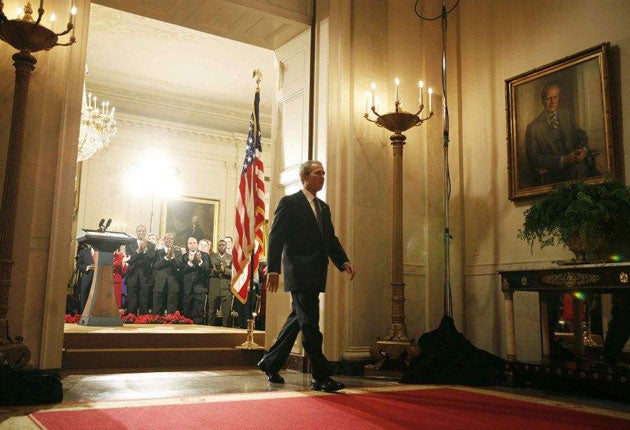Tears as Bush leaves the stage
President signs off by admitting he would have 'done some things differently if given the chance'

The ground is already shifting underfoot at 1600 Pennsylvania Avenue. The movers are on their way to Texas and, shortly after the inauguration ceremony on Tuesday, the Bushes will be whisked off the White House lawn by helicopter for the last time. But on Thursday night, the White House was an oasis of calm as Mr Bush prepared to deliver his final farewell speech to the nation.
In the stately East Room, he chatted to a small group of invited guests enthusing about the fancy new Dallas home he an Laura are moving to. The new house "is to die for", Mr Bush said, before the cameras were switched on. He will be penning his memoirs there as soon as he tracks down a suitable ghostwriter, although publishing houses have apparently shown little interest in the project so far.
For his last planned public appearance before Barack Obama's swearing-in, Mr Bush then gave a 13-minute address to the nation that was carried live on all the networks. "I hope you can agree that I was willing to make the tough decisions," he said in a spirited defence of his unpopular eight years at the helm.
The emotion of the moment was too much for his daughters Jenna and Barbara who shed tears. Even Rocco Chierichella, the tough-as-nails fireman who became a loyal friend of the President shed a few tears. The cameras captured none of that, however.
"There are things I would do differently if given the chance," Mr Bush went on, "yet I have always acted with the best interests of our country in mind. I have followed my conscience and done what I thought was right."
It was a final attempt to restore some lustre to the Bush political dynasty, which has been battered by an economic hurricane a deeply unpopular war in Iraq, the stain of torture and deeply controversial spying on American citizens at home. The outgoing President acknowledged no mistakes, but he conceded to unspecified "setbacks."
Overall, Mr Bush crowed. "There can be little debate about the results. America has gone more than seven years without another terrorist attack on our soil." Afghanistan was a great success as a "young democracy that is fighting terror and encouraging girls to go to school." Iraq was transformed from a "brutal dictatorship and a sworn enemy of America to an Arab democracy at the heart of the Middle East and a friend of the United States."
At home (where millions of Americans have been thrown out of work,) they were lower taxes and children were learning more in school.
Mr Bush even took credit for his response to the global financial crisis. "Decisive measures" were taken; he said to "safeguard our economy."
"These are very tough times for hard-working families, but the toll would be far worse if we had not acted," he said.
What Mr Bush did not explain was how he cleared the way for the invasion of Iraq, the subsequent failure to find weapons of mass destruction and the catastrophic aftermath of that conflict.
Nor did he mention Osama bin Laden, the man he vowed to capture "dead or alive" and who released another teasing audiotape this week, reminding everyone that he is about to outlive Mr Bush's presidency.
As invitees to the final reception and farewell Mr Bush had selected a group of people he believes represented his finest achievements at home and abroad. Foremost among them was Mr Chierichella, the fireman who shouted "I can't hear you," to Mr Bush when he tried to address rescue workers at Ground Zero just four days after the World Trade Centre attacks.
It triggered one of Mr Bush's most memorable lines: "I can hear you. The rest of the world hears you. And the people who knocked these buildings down will hear all of us soon."
To a frightened, angry nation, the encounter helped crystallise the aggressive response to terrorism that defined Mr Bush's years in office.
Americans are frightened again today but it is fear is of an economic catastrophe like the Great Depression of the 1930s that preoccupies many, rather than an imminent terrorist attack on "the homeland".
Also in the East Room were the father and sister of Daniel Pearl, the journalist lured to an interview by al-Qa' ida and then beheaded. Then there was the Iraqi woman whose purple stained finger became an over-optimistic symbol of the democracy Mr Bush thought he was bringing to that country.
There were also, volunteers, wounded soldiers and a former prison inmate who runs faith-based organisations, all throwbacks to Mr Bush's vision of a country that projected military might and Christian beliefs abroad.
Join our commenting forum
Join thought-provoking conversations, follow other Independent readers and see their replies
Comments
Bookmark popover
Removed from bookmarks